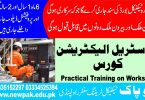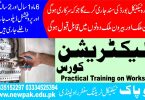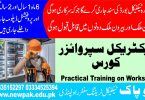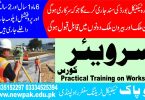
Auto Mechanic Course In Rawalpindi Islamabad
The Auto Mechanic Course offers hands-on practice to equip students with the practical skills and theoretical knowledge required in today’s automotive industry. Covering everything from engine systems and braking to diagnostics and HVAC systems, the course provides a solid foundation for those pursuing a career in vehicle maintenance and repair. Ideal for beginners and enthusiasts alike, it prepares learners for real-world challenges in the workshop environment. Upon completion, students are eligible to pursue automotive mechanic certification that can open doors to professional opportunities.
Course Overview
Our auto mechanic course In Rawalpindi Islamabad is designed to take learners from the basics of vehicle systems to advanced diagnostics and repair. Early training focuses on core skills, including engine operations, braking systems, and electrical fundamentals. As the course progresses, students delve into more specialized areas like HVAC systems, fuel technologies, and electronic diagnostics. The program blends practical workshop experience with technical theory, guiding participants toward industry-recognized auto mechanic training and certification.
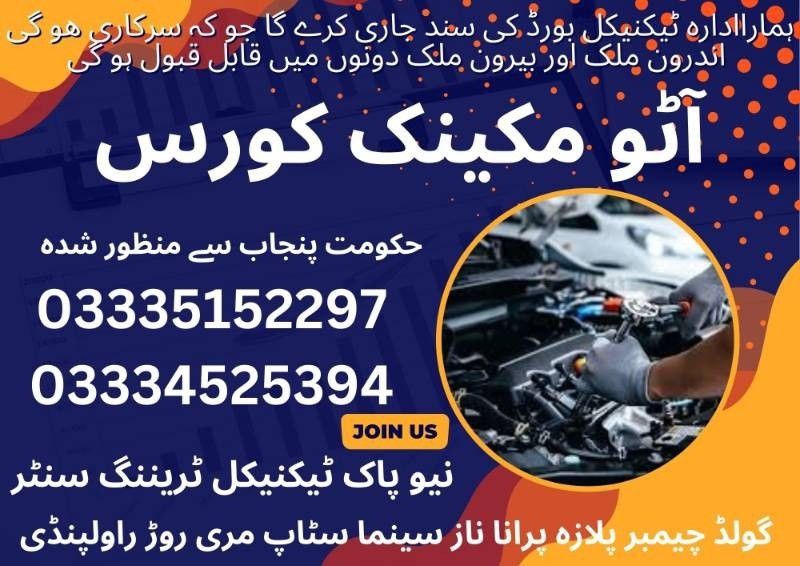
Course Duration
06 | Months
-
Introduction to Automobiles
-
Basic Tools & Equipment
-
Engine Fundamentals
-
Engine Maintenance & Repair
-
Transmission Systems
-
Braking Systems
Suspension & Steering Systems -
Electrical Systems (Basics Only)
-
Practical Workshops & Assessments
01 | Year
Detailed Automobile Repairing
Professional use of Tools & Equipment
Engine Fundamentals
Engine Maintenance & Repair
Transmission Systems
Braking Systems
Suspension & Steering SystemsElectrical Systems (Basics Only)
Fuel Systems
HVAC Systems
AdvancedDiagnostics & Technology
Practical Workshops & Assessments
Auto Mechanic Certification Prepration
Course Outline (6 Months)
Introduction to Automobiles
Month 1
- History and evolution of automobiles
- Types of vehicles and their purposes (cars, motorcycles, commercial vehicles)
- Safety precautions in automotive workshops
Basic Tools and Equipment
Month 2
- Introduction to tools used in auto repair (spanners, wrenches, screwdrivers)
- Understanding and using diagnostic equipment (multimeters, OBD-II scanners)
- Safety gear and equipment in the workshop (protective clothing, goggles, gloves)
Engine Fundamentals
Month 3
- Internal combustion engine basics (four-stroke cycle, engine components)
- Types of engines (petrol, diesel, hybrid) and their working principles
- Engine cooling systems and lubrication systems
Engine Maintenance and Repair
Month 4
- Engine tune-up procedures (spark plugs, air filters, timing adjustment)
- Engine diagnostics and troubleshooting (checking compression, leaks)
- Overhauling techniques for engines (top-end and bottom-end overhaul)
Auto Transmission Systems
Month 5
- Manual transmission operation and maintenance
- Automatic transmission basics and common issues
- Clutch and gearbox inspection, repair, and replacement
Automotive Braking System Overview
Month 6
- Types of braking systems (disc brakes, drum brakes)
- Brake components and their functions (pads, rotors, calipers)
- Brake maintenance, bleeding, and adjustments
Course Outline (1-Year)
Months 1–6: Auto Mechanic Course in Rawalpindi Islamabad Basics
(Same course content as the 6-month program but with more detail, software technologies, and assessments.)
Suspension and Steering Systems
Month 7
- Suspension types (coil spring, leaf spring, independent suspension)
- Steering system components (rack and pinion, steering column)
- Wheel alignment procedures and suspension adjustments
automotive Electrical Systems
Month 8
- Basics of automotive electrical systems (batteries, alternators, starters)
- Wiring diagrams interpretation and electrical troubleshooting
- Testing and replacing electrical components (lights, sensors, relays)
Automotive Fuel Systems
Month 9
- Fuel injection systems (types, components, maintenance)
- Carburetor operation and tuning
- Fuel system cleaning, calibration, and troubleshootin
HVAC Systems in Vehicles
Month 10
- Heating, ventilation, and air conditioning fundamentals
- HVAC system components (compressor, condenser, evaporator)
- HVAC system diagnostics and repair
System Analysis Technology
Month 11
- Advanced diagnostic techniques (using scan tools, oscilloscopes)
- Understanding vehicle computer systems (ECU, sensors)
- Emerging technologies in automotive repair (hybrid and electric vehicles)
Practical Training and Workshops
Month 12
- Hands-on training with real vehicles in a workshop environment
- Practical exercises in diagnosing and repairing common automotive issues
- Final assessments and certification exams
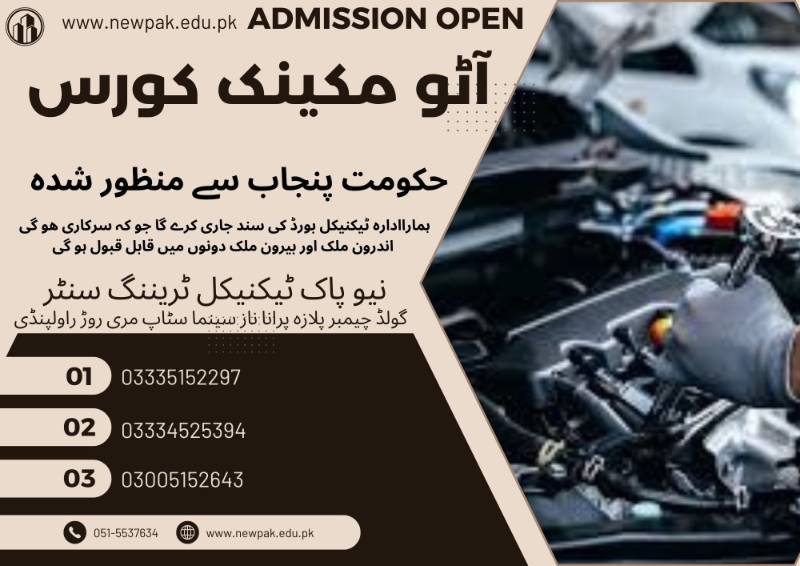
Career Opportunities
- Automotive Mechanic
- Workshop Supervisor
- Car Mechanic
- Diagnostic Technician
- Service Advisor
- Automobile Mechanic
- Auto Electrician
- HVAC Technician (Automotive)
- Vehicle Inspection Officer
- Automotive Trainer/Instructor
Conclusion
By the end of this comprehensive auto mechanic course in Islamabad, students will have developed advanced diagnostic abilities, technical auto repair skills, and a clear understanding of modern vehicle systems. With foundational knowledge and real-world experience, learners will be well-prepared to gain auto mechanic certification or progress toward higher-level automotive mechanic certification programs. Whether aiming to work in a professional workshop or run their own service business, this structured training ensures readiness for a rewarding career.

